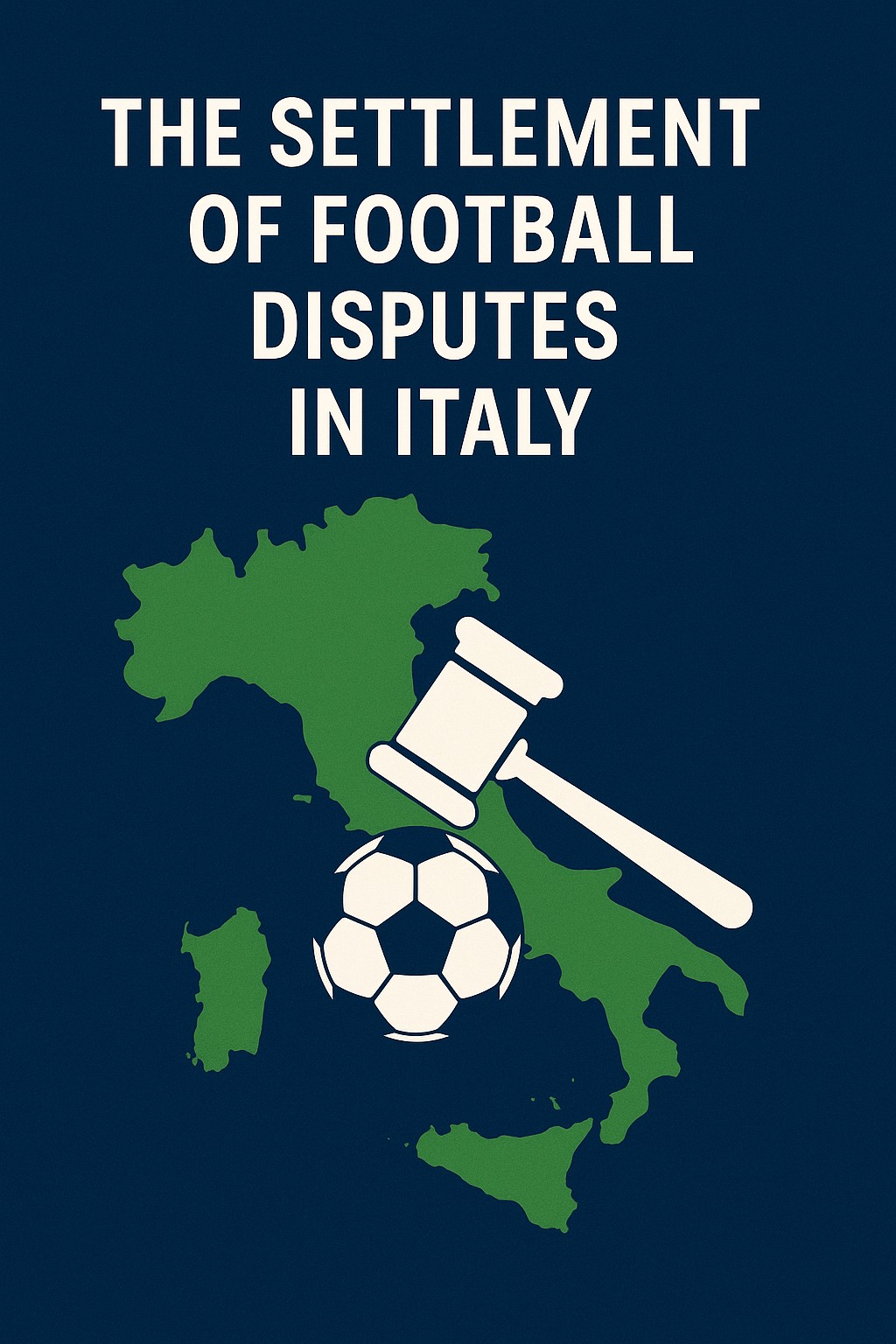THE SETTLEMENT OF FOOTBALL DISPUTES IN ITALY

The system of dispute resolution in Italian sport, and particularly in association football, represents an area of considerable complexity, where principles of autonomy of the sporting order intersect with the limits arising from its necessary submission to state judicial review. The analysis of recent cases, such as the Juventus “salary manoeuvre”, highlights both the critical issues and the strengths of a system that is constantly balancing sports justice with ordinary justice.
- The architecture of sports justice within the FIGC (Italian Football Federation).
The domestic sporting order is grounded in the FIGC Code of Sports Justice (Codice di Giustizia Sportiva, CGS), which sets out in detail the jurisdiction of the various adjudicating bodies. The so-called “dual-track model” is now well established: on the one hand, the Sports Judge and the Sports Court of Appeal, competent for events occurring during championships and competitions and for issues concerning the regularity of matches; and on the other, the National Federal Tribunal and the Federal Court of Appeal, which address more significant matters, including those of a disciplinary and financial-managerial nature.
Internal jurisdiction is supplemented by the possibility of plea bargaining (art. 126 CGS), which allows clubs to conclude disciplinary proceedings prematurely in exchange for an agreed sanction. Whilst criticised for the risk of “negotiated justice”, this mechanism has been widely applied in practice.
- The Juventus case: the “salary manoeuvre” as a paradigm.
The Juventus affair offers a privileged vantage point. The club was referred for improperly accounting the deferral of several salary instalments owed to players during the COVID-19 pandemic. According to the Federal Prosecutor’s Office, such an arrangement violated the principles of accounting truthfulness and distorted fair competition amongst clubs.
In May 2023, the National Federal Tribunal ratified a plea bargain resulting in a fine of approximately €718,000 (around Sw. Frs. 670,000) and, crucially, the confirmation of a 10-points deduction previously imposed. The club waived further appeals, underscoring the pragmatic nature of a decision aimed at avoiding more severe consequences.
This case demonstrates how the FIGC system manages to balance rigour and flexibility, whilst simultaneously raising questions about legal certainty and the external perception of impartiality.
- The interface with state justice: the role of the TAR (Regional Administrative Tribunal).
The provisions of Law No. 280 of 17 October 2003 enshrine the principle of autonomy of the sporting order, restricting state courts’ intervention to disputes affecting subjective rights protected by the general legal system. Article 3 of the law introduces the so-called “sports precondition” (pregiudiziale sportiva): recourse to state courts is admissible only once internal remedies have been exhausted.
Within this framework, the TAR plays a central role, having jurisdiction over acts with nationwide effect. Administrative case law has repeatedly confirmed that FIGC decisions may only be reviewed within the limits of formal legality, leaving untouched the technical-sporting merits. This fine but essential distinction preserves the autonomy of football governance without undermining the constitutional principle of judicial protection (Article 24 of the Italian Constitution).
- The CONI (Italian National Olympic Committee) Court of Arbitration and the role of CAS (Court of Arbitration for Sport).
At the national level, the Collegio di Garanzia dello Sport (Sports Guarantee Board) within the (CONI) represents the final tier of sports justice: it does not re-examine the merits of disputes, but verifies procedural correctness and compliance with the general principles of the sporting order.
At the international level, broader disputes may be brought before the Court of Arbitration for Sport CAS, based in Lausanne, Switzerland, which functions as an independent and neutral forum. Practice shows a growing number of appeals, particularly concerning international football transfers, training compensation, and anti-doping violations. With its consolidated body of case law, CAS contributes to harmonising standards of sports justice on a global scale.
- Mediation and integrity: future perspectives.
Although mediation is envisaged as an alternative method of dispute resolution, its practical application remains limited, given its non-binding nature unless mutually accepted by the parties. Nevertheless, in the context of increasing conflicts, it may provide an opportunity to reduce litigation and foster a culture of dialogue.
Equally relevant is the issue of transparency. Scandals such as Calciopoli (the manipulation of referee appointments to favour certain football clubs) and more recent events have highlighted the need for proceedings that are not only fair but also perceived as such by the public. The adoption of integrity protocols, the timely publication of reasoned decisions, and greater consistency in sanctions represent the pillars upon which the credibility of the sports justice system in Italy ultimately depends.
We act in the settlement of all kinds of football disputes in Italy and further information is available form the Head of our Italian Law Practice, Avv. Sara Botti, by emailing her at botti@valloni.ch.